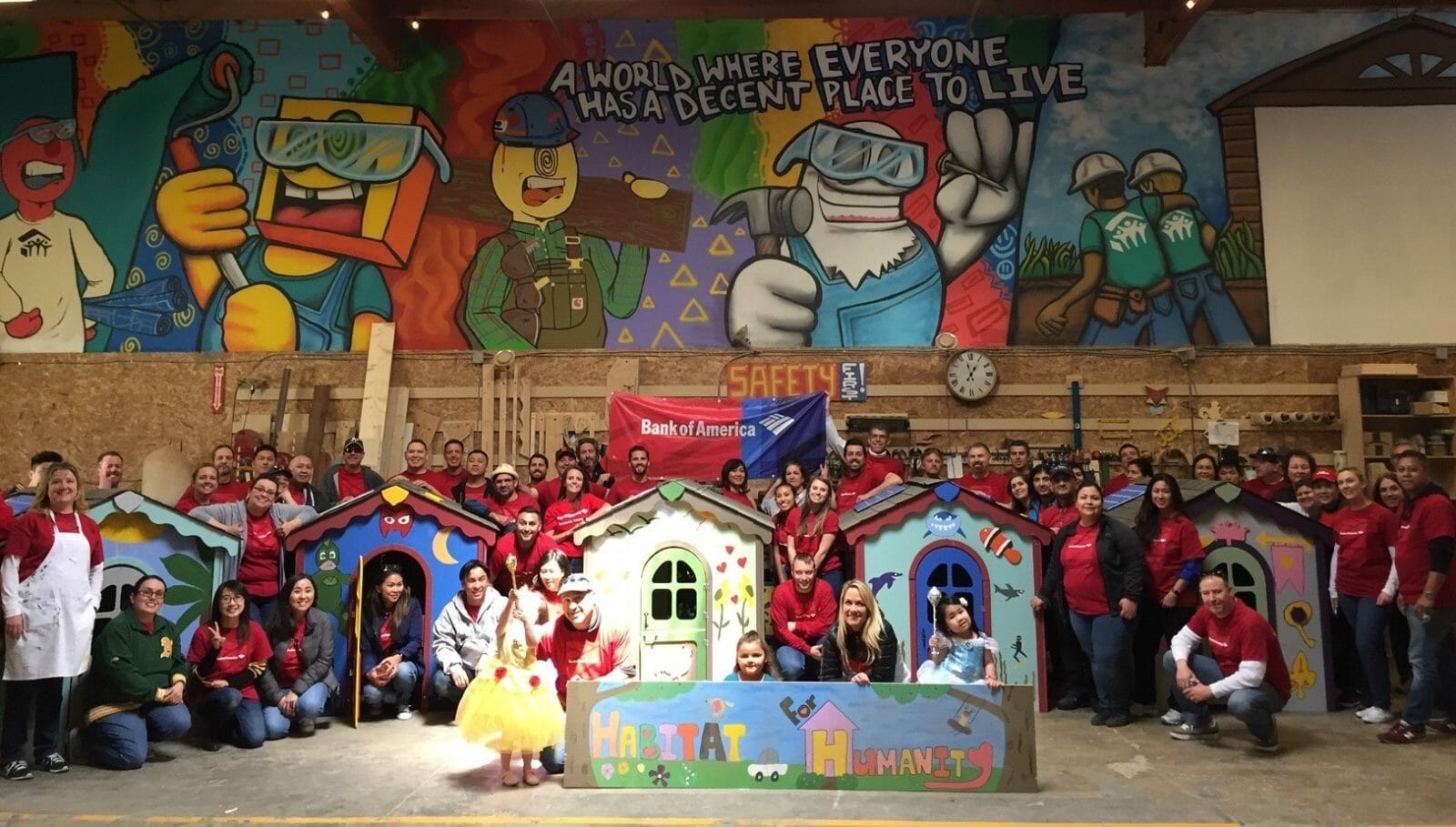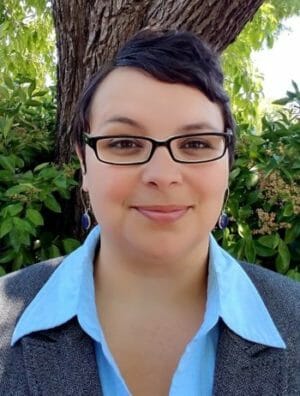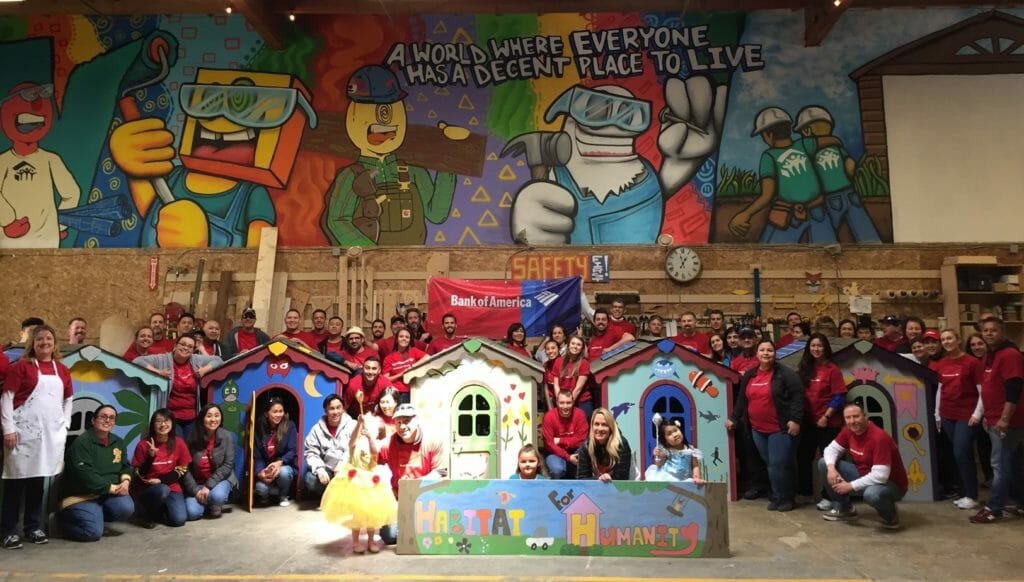Bank of America Employee Teaches Financial Literacy to Hundreds Across San Francisco

Erica Jones says volunteerism is in her blood. Growing up, she watched her father do a lot of fundraising through the theater and drag community. She says her dad’s example, along with watching family members go through their own difficulties in life, led her to develop a lifelong value that if you receive then you need to give, and if you learn then you need to teach.
This value is what drives the Bank of America employee to spend roughly 20 hours each month volunteering with Better Money Habits, which provides free tools and information about personal finance. After having worked for Bank of America for 20 years, currently as a Treasury Solutions Analyst Assistant Vice President and Financial Literacy Officer, Erica stepped up to join Better Money Habits Volunteer Champions, a cohort of employees who deliver financial wellness resources to their local communities. Since first becoming involved with the volunteer program three years ago, Erica has brought the financial information she has learned throughout her career to San Francisco and East Bay, teaching financial literacy sessions and helping to coordinate the education for community members ranging from formerly incarcerated individuals to college students.
“When it comes to things like money and economic mobility and progress, I want to see my community and my family and the underserved sort of populations prosper,” Erica said, “because we all prosper when that happens.”
For going above and beyond her job to help spread financial knowledge and prosperity to all walks of her community, Erica is today’s Daily Point of Light award honoree. Points of Light spoke with Erica to learn more about what Better Money Habits does for its community.

Describe your volunteer role with Better Money Habits.
So maybe two or three years ago, the bank promoted their Better Money Habits Champions cohort and I jumped on it because I currently am, [and] at the time was, the Financial Literacy Officer for our community volunteers organization. So any financial literacy event that we had, I would help coordinate, made sure we had enough people, make sure the volunteers knew what to do. Then as Better Money Habits really grew and became more robust, I joined a cohort of folks that are on the team to learn about upcoming developments in the program and new curriculum we offer. I was really working closely with our junior achievement partners as well, so there are several nonprofits that I have presented to. We do a couple different ways that we can get involved with Better Money Habits, [including] going out to actually deliver the curriculum directly to the population. For example, Bank of America funded the first internship at the San Francisco Museum of Modern Art, so I went out to present these Better Money Habits tools to their newest intern group. Another option we have is our train-the-trainer session. So with organizations that already have some element of financial literacy in their program set up, I will teach the nonprofit how to use our materials and really address the sort of nitty gritty questions that come up in financial literacy training, versus sort of, if you just have a budget, you can do better. It’s more like, ok, what do you if you’re living paycheck to paycheck? How do you set up an emergency fund when you don’t feel like you have a lot of money to spread around? We give them the tools to really make their financial literacy programs robust. So again any sort of financial literacy opportunity that comes up in San Francisco, and some in the East Bay as well, I help to coordinate and I get connected with the nonprofit community partner that we have and really make sure that we have people show up.
I am now the [Bank of America Community Volunteers San Fransisco] co-chair, so along with financial literacy, I’m also helping to coordinate and improve our volunteer shift in San Fransisco among many other topics. But my heart is in Better Money Habits. For example, [the week of March 25th], I’m doing a dry run with an organization called Corrections to College in Berkley. What they do is help focus their formerly incarcerated to begin a path of sustainable life progress, so whether that’s going back to school, getting full time work, etc. So I will be presenting to state-wide students in community colleges that are part of the Corrections to College program, and we will be doing a Better Money Habits session for them and then as the program goes on I’ll probably be doing a second one later this year.
Why is financial literacy important to you?
I’ve been with Bank of America for 20 years. I grew up very much in a working class family. We didn’t have a lot, but we made do. I worked 15 of my 20 years in our local branches, so I was able to work with folks that were living paycheck to paycheck, that were really struggling with any bank fees or were really struggling with making ends meet. They would ask the questions, what can I do? How can I get better at this? And I feel like it’s really my duty to bring the access and the knowledge that I have working for a financial institution at a bank, to bring that back to my community, to bring that back to the customers that are really struggling, to bring it back to my family, bring it to my friends. To me it’s important that as I learn and I gain more access and knowledge and skills, that I turn around and share that information. Even if it means that I learned something really simple and basic, it’s important for me to spread that knowledge because it doesn’t do any good if it just stays within the institution.
What kind of feedback to you receive from people who attend the Better Money Habits sessions?
The feedback is that it is accessible, it’s really easy to use, it makes a difference. It gives folks really a tangible thing to either take with them back to their everyday lives or give them a real sense of, ok, I think I can do this, versus it being this sort of high-level, theoretical idea of financially literacy. It really helps people refocus their time. One of the other nonprofits we work with is the Justice and Diversity Center here in San Francisco. They partner with the San Francisco Bar Association, and the bar association offers pro bono attorney work for folks that have run into financial difficulties, whether they’re being sued, whether they’re facing foreclosure, whatever that is and they need legal assistance. As part of that program, they ask us to come in monthly to deliver financial literacy curriculum that’s based around recovering from financial loss or difficulties and repairing your credit. The folks that leave out of that session, they say things like they had no idea that some of this information was out there. These are folks that tend to be sort of technologically disadvantaged or maybe they don’t have access, so the information isn’t just readily available at people’s fingertips. They’re really grateful for a starting point for information they probably would not have come across. So gratitude and just really motivation is the feedback I get.
Are there any future partnerships, programs, or events that you are excited about?
There are some nonprofits that we partner with that I’m going to be reaching out to. But I think what’s important to me is to not only spread it just to the nonprofits but to really get our employees out there to the nonprofits and to the community generally. A1 Community Housing Services in Hayward, they are one that really wants to partner with us. And St. Marys College, we’re about to start next month an ongoing partnership with their low-to-moderate student base. We’ll be delivering monthly Better Money Habit sessions to that cohort of students who are in school but maybe had a difficult road getting there financially.

What’s been the most rewarding part of your work?
I’ve had my own personal financial difficulties and like I said, I grew up in a pretty working class family so I know what it’s like to struggle, and to be especially in an area like San Francisco, where it’s so astronomically expensive to live that you’re really desperate for some relief. So what’s most rewarding is that I can take some knowledge that I have access to — and I am no means an expert — but I can take someone’s story, hear it, and really relate to it and be able to then say, ‘Here’s what I’ve been able to learn from doing these sessions but also from my personal life, and I want to give you as much knowledge as I have to help you.’ Seeing the impact that has and making it a human connection has been really rewarding and important to me.
What have you learned through your experiences as a volunteer?
No one situation or experience is the same. If you aren’t able to meet someone at their level and at their starting point, then we’re doing them a disservice, so it’s important to understand the challenges that an individual has faced and where they want to go and start with them there. There’s no magic wand, there’s no special formula that will make you rich, right? But understanding what people need and meeting them there versus having a set script that you want to give someone is the most impactful version of volunteering to me.
What do you want people to learn from your story?
The opportunity is there and the need is there. All we have to do is really just take one step into it. All we have to do is start somewhere and you turn around, and like me, three years later I have worked with hundreds of volunteers on tons of different projects. It’s really amazing the impact we can make. So just start somewhere, anywhere, giving back, and the sort of impact you can make will be exponential down the road. That’s what my lesson is — I was afraid to start and once I did, it just took off.
Do you want to make a difference in your community like Erica? Click here for local volunteer opportunities.
Post written by Morganne Mallon.
